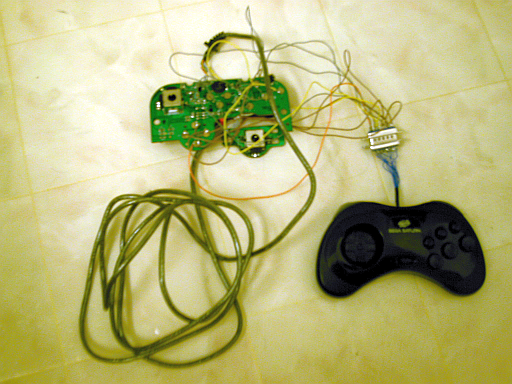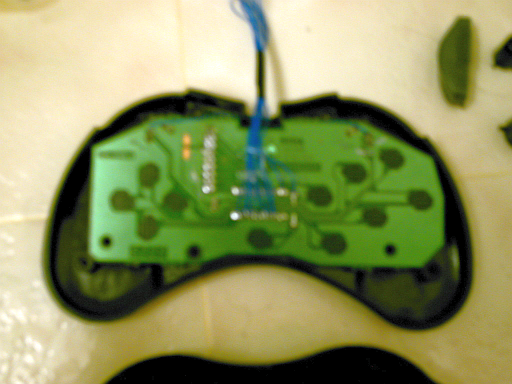Knowing this, game companies have manufactured adapters for a variety of systems, ranging from Sega's Dreamcast to plain vanilla home computers. There was even a replica of the flawless Saturn controller released for the Playstation 2 in 2005. However, neither of these solutions are completely reliable. The adapters are limited to a handful of formats, and the replica controller has become obscenely expensive in the three years since it was available in import stores. Even if you're willing to shell out a hundred dollars or more for the joypad, there's no guarantee it will work with your favorite 2D games. Odin Sphere, the spiritual sequel to Princess Crown, refuses to recognize it, and it's just as useless with collections like Namco Museum 50th Anniversary and Mega Man Collection.
Perhaps the greatest frustration of all is that the razor-sharp precision of the Sega Saturn controller has been completely unattainable on Nintendo consoles, particularly the GameCube and its more popular successor the Wii. It's possible to get the replica controller working with the original Xbox if you daisychain it to an adapter, but if you're a GameCube or Wii fan, you're out of luck. Your only option would be to somehow build your own controller... which is exactly what I set out to do last night.
 Inspired by similar projects on the Internet, I decided to make one of my spare Saturn controllers compatible with the GameCube and its close cousin. I first opened the Saturn controller, removed the original cable, popped off the logic chip in the center of the printed circuit board, then connected a series of very thin wires to the traces left in the chip's wake. These wires were then soldered to a male 15-pin D-shell connector.
Inspired by similar projects on the Internet, I decided to make one of my spare Saturn controllers compatible with the GameCube and its close cousin. I first opened the Saturn controller, removed the original cable, popped off the logic chip in the center of the printed circuit board, then connected a series of very thin wires to the traces left in the chip's wake. These wires were then soldered to a male 15-pin D-shell connector.(This connector is as old-school as it gets... it's used as the gameport in older personal computers as well as the controller port in the ancient Atari 5200 game system. It's not as elegant as the Saturn's flat connector, but it's extremely handy in a project like this, where you're making simple wire-to-wire connections rather than routing buttons through a logic chip.)
 After I was finished with the Saturn controller, I then took a cheap third party GameCube joypad, opened the case, then soldered wires to the metal pads on its own printed circuit board. Some of these pads were split in half with an Xacto knife before making the connections to keep the signal and ground separate. The other ends of the wires were then soldered into another 15-pin D-shell connector; this time female.
After I was finished with the Saturn controller, I then took a cheap third party GameCube joypad, opened the case, then soldered wires to the metal pads on its own printed circuit board. Some of these pads were split in half with an Xacto knife before making the connections to keep the signal and ground separate. The other ends of the wires were then soldered into another 15-pin D-shell connector; this time female.There was a lot of setup involved, but all that effort was ultimately worthwhile. I'm a legendary klutz when it comes to electronics, and my projects rarely work the first time around. Luckily for me, this was one of those rare exceptions. I pulled my old GameCube out of the closet (no sense in taking any unnecessary risks with the Wii!), then plugged the finished project into it and popped in a copy of Alien Hominid. Every button I had wired up on both ends as well as the D-pad worked as planned. There were some slight issues with the A button sticking, but that was a mechanical error; something I fixed by cleaning the joypad housing with a toothbrush and a dab of dishwashing liquid.
Right now the joypad is working at 90% efficiency. I don't have the L and R buttons wired up on the GameCube controller, although those connections have been made on the Saturn joypad. Also, you can't use the C button for GameCube games, since the system doesn't really have one. The good news is that this design doesn't limit me to just the GameCube or Wii... it's modular, so I can apply it to all kinds of systems by tearing up their respective controllers. Holy crap, I just realized that I could make 3DO games playable with this hack! Way of the Warrior, here I come! Okay, maybe just Super Street Fighter II Turbo.
If you're handy with a soldering iron, I would definitely recommend giving this project a shot. All you need is a spare Saturn controller, a joypad from the game system you'd like to adapt, some very thin gauge wire (for the Saturn controller's PCB, it doesn't really matter what kind of wire you use for the other controller), and two 15-pin D-shell connectors; one male and one female. If you're feeling lost, this web site will give you some idea of what you'll need to do to get your Saturn controller working on other systems.
http://www.gamesx.com/controldata/usbsatpad/index.shtml
However, if you've ever worked with electronics, you won't have much trouble with this hack. There are no resistors, no capacitors, and none of that migraine-inducing electronics math... you just follow the traces from the pads on the Saturn controller's PCB to the buttons, and wire them up accordingly. Just make sure you're using a really thin tip on your soldering iron, and keep the wires separated so you won't get mixed signals while you're playing games.
I'll keep you guys informed on the progress of this mod, as well as its functionality with the Wii and any other modules I create in the future. I've already got my eyes set on that Super NES controller I've got buried in the closet...

All systems go on the Wii! I've also wired up the L and R triggers, so those work too. I had a ball playing VC games with this controller... now I just need to get a lengthier 15-pin cable to make it more comfortable to use.
ReplyDeleteDamn Amazing!!
ReplyDeleteGood stuff Arugulaz! I always marvel at people's ingenuity... I find changing a lightbulb a bit of a challenge! Which VC games have been bettered by use of the wonderful Saturn controller?
ReplyDeleteWow, like deitrix said, that's right down amazing! Electronics knowledge and Sega love combined. Top stuff, Arugulaz.
ReplyDeleteI would never be able to do that! I've been thinking of getting a USB Saturn controller for some PC games and VC games (apparently they work on the Wii)
ReplyDeleteKrishna: At the moment, not too many. I've tested it out with Teenage Mutant Ninja Turtles: Tournament Fighters, which I've installed on my Wii using the Twilight Princess exploit and VC Injector. It plays BEAUTIFULLY... performing special attacks and combos has never been easier!
ReplyDeleteOn the down side, and somewhat ironically, the controller kind of sucks with Genesis games because the button layout on the GameCube is all wrong for them. There's no C button, making Streets of Rage 2 kind of painful to play. The only way I could work around this is to add switches inside the host controller to reassign buttons without constantly resoldering the connections.
This is also what I'd have to do with the 3DO converter if I build one. Most games use the P button for pause, but the only one that really matters (Super Street Fighter II Turbo) replaces P with X, so you're constantly pausing when you want to attack. A switch would be a necessity for a good 3DO controller adapter, just because of that ONE GAME. Thanks, Capcom...
I just finished the 3DO adapter! It works great, except for that little problem I mentioned earlier... I need to add a switch to swap buttons for Super Street Fighter II Turbo. Either that or settle for playing the Saturn version, I dunno...
ReplyDeleteHaving absolutely no technical skill myself, I'd pay someone who could rig a Saturn 3D controller for use w/ the Wii. I could finally enjoy NiGHTS: JoD to the fullest.
ReplyDeleteGreat post, but I'm a little confused about the part where you solder the metal pads on the Gamecube PCB. Do you just put a blob of solder to connect the wire AND both of that button's leads? How exactly do you cut the PCB with the xacto knife?
ReplyDeleteRe: anonymous, the Wii NiGHTS game is pretty good with the Gamecube controller. Too bad most of the levels in the game aren't standard flying.